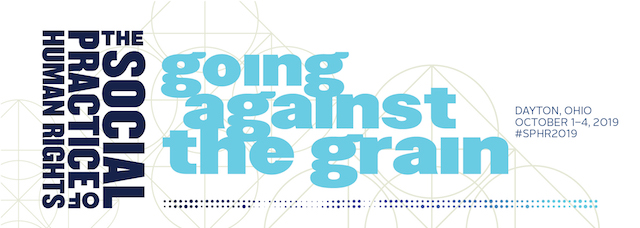Location
Intersection of Arts, Tech, and Advocacy
Start Date
10-3-2019 9:00 AM
End Date
10-3-2019 10:30 AM
Keywords
citizenship, music, performance
Abstract
My work explores the capacity of cultural producers to perform “insurgent citizenship,” a term theorized by James Holsten (2008) to describe how the peripheries of social organization can propel alternative modes of civic participation, through music. I utilize Engin Isin’s performative dimension of citizenship (2017) to investigate such forms of insurgent citizenship as they evolve in social and cultural peripheries of the contemporary arts and culture industry in the city of Dresden, Germany to identify the pathways they open to socio-political participation and autonomy for refugees.
While Germany understands itself as a nation of culture, cultural policy unevenly addresses the contributions made by migrants and refugees, especially in regions such as the state of Saxony that concentrate primarily on promoting traditional, local cultures (van der Will & Burns, 2015). The artistic potential of migrants and refugees only enters the official discourse framed within the question of how to accelerate their integration into German society, but not with regard to their full enjoyment of citizens’ rights in the host society (Schmidt, 2016; Rosenhagen 2017). Contrary to that, the German musician collective Banda Internationale, an established affiliation of local musicians that expanded to include refugee performers during heated right-wing tensions in the city of Dresden in 2016, depoliticizes “refugeeness,” and instead engages with the quality of the voice that individuals have as subjects.
This presentation will demonstrate the strategies and risks involved in representing marginalized performers as speakers who, precisely because they are musicians, possess the authority to shape their environment and the people therein. I will illustrate how these musicians reassure each other their right to develop alternative spaces for civic engagement through music themselves. Such spaces can translate into new sources for economic and social capital which in turn has significant implications for refugees’ legal standing, but they can also lead to the exploitation of refugee’s artistic capital for its social-work value.
Author/Speaker Biographical Statement(s)
Carolin Mueller is a PhD Candidate in the Department of Germanic Languages and Literatures at Ohio State University. She obtained her M.Ed. in English and Art Studies at the Technical University Dresden and her M.A. in German Languages and Literatures at Ohio State University. Her work has been published in the The International Encyclopedia of Art and Design Education and Historical Journal of Film, Radio and Television. Her research is focused on issues of belonging and citizenship in migrant and musical activism in contemporary Germany. In her doctoral project she explores how the discourse on borders has shaped how cultural practices respond to, intervene, contest or critique social and political developments.
Included in
Ethnomusicology Commons, European Languages and Societies Commons, Folklore Commons, German Language and Literature Commons, Migration Studies Commons, Performance Studies Commons, Social and Cultural Anthropology Commons
The Strategies and Risks of Performing Citizenship And Rights Through Music
Intersection of Arts, Tech, and Advocacy
My work explores the capacity of cultural producers to perform “insurgent citizenship,” a term theorized by James Holsten (2008) to describe how the peripheries of social organization can propel alternative modes of civic participation, through music. I utilize Engin Isin’s performative dimension of citizenship (2017) to investigate such forms of insurgent citizenship as they evolve in social and cultural peripheries of the contemporary arts and culture industry in the city of Dresden, Germany to identify the pathways they open to socio-political participation and autonomy for refugees.
While Germany understands itself as a nation of culture, cultural policy unevenly addresses the contributions made by migrants and refugees, especially in regions such as the state of Saxony that concentrate primarily on promoting traditional, local cultures (van der Will & Burns, 2015). The artistic potential of migrants and refugees only enters the official discourse framed within the question of how to accelerate their integration into German society, but not with regard to their full enjoyment of citizens’ rights in the host society (Schmidt, 2016; Rosenhagen 2017). Contrary to that, the German musician collective Banda Internationale, an established affiliation of local musicians that expanded to include refugee performers during heated right-wing tensions in the city of Dresden in 2016, depoliticizes “refugeeness,” and instead engages with the quality of the voice that individuals have as subjects.
This presentation will demonstrate the strategies and risks involved in representing marginalized performers as speakers who, precisely because they are musicians, possess the authority to shape their environment and the people therein. I will illustrate how these musicians reassure each other their right to develop alternative spaces for civic engagement through music themselves. Such spaces can translate into new sources for economic and social capital which in turn has significant implications for refugees’ legal standing, but they can also lead to the exploitation of refugee’s artistic capital for its social-work value.



